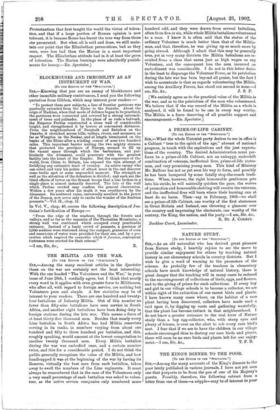BLOCKHOUSES AND IMMOBILITY AS AN INSTRUMENT OF WAR.
[TO THE. EDITOR OP THE • SPECTATOR."]
Stn,—Knowing that you are an enemy of blockhouses and other immobile military contrivances, I send you the following quotation from Gibbon, which may interest your readers :—
"To protect these new subjects, a line of frontier garrisons was gradually extended from the Rhine to the Danube. About the reign of Hadrian, when that mode of defence began to be practised, the garrisons were connected and covered by a strong entrench- ment of trees and palisades. In the place of so rade a bulwark, the Emperor Probus constructed a stone wall of considerable height, and strengthened it by towers at convenient distances. From the neighbourhood of Neustadt and Ratisbon on the Danube, it stretched across hills, valleys, rivers, and morasses, as far as Wimpfen on the Neckar, and at length terminated on the banks of the Rhine after a winding course of near two hundred miles. This important barrier uniting the two mighty streams that protected the provinces of Europe, seemed to fill up the vacant space through which the barbarians, and par- ticularly the Alemanni, could penetrate with the greatest facility into the heart of the Empire. But the experience of the world, from China to Britain, has exposed the vain attempt of fortifying any extensive tract of country. An active enemy who can select and vary his points of attack must in the end discover some feeble spot or some unguarded moment. The strength as well as the attention of the defenders is divided; and such are the blind effects of terror on the firmest troops that a line broken in a single place is almost instantly deserted. The fate of the wall which Probus erected may confirm the general observation. Within a few years after his death it was overthrown by the Alemanni. Its scattered ruins, universally ascribed to the power of the Demon, now serve only to excite the wonder of the Suabian peasants."—Vol. IL, chap. 12.
In 'Vol. V, chap. 40, occurs the following description of Jus- tinian's fortification of Europe
"From the edge of the seashore, through the forests and valleys, and as far as the summits of the Thessalian Mountains, a strong wall was continued which occupied every practicable entrance. Instead of a hasty crowd of peasants, a garrison of 2,000 soldiers were stationed along the rampart, granaries of corn and reservoirs of water were provided for their use, and by a pre- caution which inspired the cowardice which it foresaw, convenient fortresses were erected for their retreat."






































 Previous page
Previous page